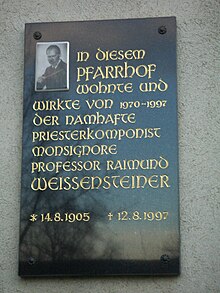Raimund Weissensteiner

Raimund Vinzenz Weissensteiner (born August 14, 1905 in Hoheneich , Lower Austria , † July 12, 1997 in Vienna ) was an Austrian priest and composer .
Life
He attended the Zwettl grammar school from 1916 to 1918 and entered the Hollabrunn boys' seminar in 1918 . In 1924 he graduated from the Hollabrunn High School and then entered the Vienna seminary . After studying theology, he was ordained a priest on June 29, 1929 in Vienna . Then he was chaplain in Hollabrunn and from 1933 in the parish of St. Brigitta in Vienna XX.
He studied at the Vienna Music Academy with Oswald Kabasta and Franz Schmidt and on June 13, 1934 passed the diploma examination in composition as a major. In 1938 he became a chaplain at the Votive Church in Vienna and in the same year began teaching at the music academy. He was arrested by the Gestapo in 1943 and sentenced to three years in prison. He escaped being transferred to Mauthausen in 1945 by fleeing. He then resumed teaching at the Music Academy until 1968.
In 1984 he was awarded the Austrian Cross of Honor for Science and Art, 1st Class . In 1989 he was appointed chaplain to His Holiness ( Monsignor ). He is buried in the priest's burial ground in Vienna's central cemetery .
Works
Oratorios Das Hohe Lied (1936), The great mystery (1953/54), Nobody knows his time (1958), What rage the heathen (1962/63); Chamber oratorios, chamber music, church music, 12 symphonies, songs, orchestral, choral, piano and organ works.
literature
- Leopold Wech: Raimund Weißensteiner - Life, Confession, Music . Mayer & Comp, Vienna 1975.
- Leopold Wech: Raimund Weißensteiner - Life, Confession, Music. Volume 2 . Mayer & Comp, Vienna 1992.
Web links
- Entry on Raimund Weissensteiner in the Austria Forum (in the AEIOU Austria Lexicon )
| personal data | |
|---|---|
| SURNAME | Weissensteiner, Raimund |
| ALTERNATIVE NAMES | Weißensteiner, Raimund |
| BRIEF DESCRIPTION | Austrian priest and composer |
| DATE OF BIRTH | August 14, 1905 |
| PLACE OF BIRTH | Hoheneich , Lower Austria |
| DATE OF DEATH | July 12, 1997 |
| Place of death | Vienna |